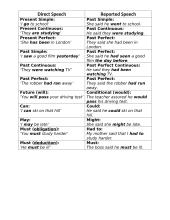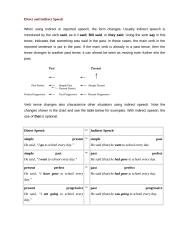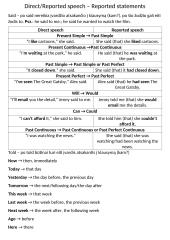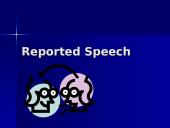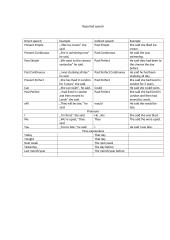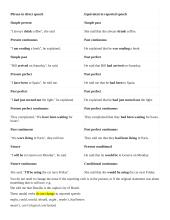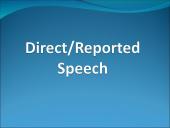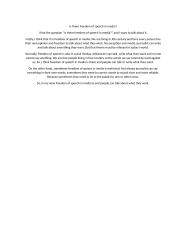Pristatymai
Reported (Indirect) Speech
e.g. He said (that) he had lost his umbrella.
• We use quotation marks: “...”
• We use reporting verbs such as say, tell, said, talk, speak.
Direct Speech vs Reported Speech (changes)
DIRECT SPEECH
REPORTED (INDIRECT) SPEECH
• We keep the verb tense the same in the quotations.
e.g. He said, “I never eat meat.”
• Normally, we change the verb tense when using indirect speech.
e.g. He said that he never ate meat.
He said, “I like my new house.”
• Pronouns and possessive adjectives usually change from first or second to third person:
– He said he liked his new house.
e.g. “I saw her yesterday,” he said.
• We also change expressions of time and place:
e.g. He said he had seen her the day before.
Tense changes
Direct Speech
Indirect speech
Present Simple
Past Simple
“My dad is at work,” Becky said.
“I don’t like dogs,” Ben said.
Becky said her dad was at work.
Ben said he didn’t like dogs.
V / Vs
don’t / doesn’t V
V ed / II
didn’t V
Present Continuous
Past Continuous
“He is wearing a blue top,” Michelle said.
Michelle said (that) he was wearing a blue top.
am / is / are Ving
was / were Ving
Past Simple
Past Perfect
“We moved to London in 2010,” Phil said.
Phil said (that) they had moved to London in 2010.
V ed / II
didn’t V
had V ed/III
hadn’t V III/ed
Change in time and place expressions:
• now → then / at that time
• today → that day
• yesterday → the day before
• last night → the night before
• last week → the week before / the previous week
• tomorrow → the next day / the following day
• next week → the following week
• a year ago → a year before / the previous year
• here → there
NOTE:
• If indirect speech is introduced by a verb in a present tense (say(s), tell(s), report(s), etc.), we can report the direct speech without any change of tense.
e.g. Paul says, “I’m trying to...
Šį darbą sudaro 771 žodžiai, tikrai rasi tai, ko ieškai!
★ Klientai rekomenduoja
Šį rašto darbą rekomenduoja mūsų klientai. Ką tai reiškia?
Mūsų svetainėje pateikiama dešimtys tūkstančių skirtingų rašto darbų, kuriuos įkėlė daugybė moksleivių ir studentų su skirtingais gabumais. Būtent šis rašto darbas yra patikrintas specialistų ir rekomenduojamas kitų klientų, kurie po atsisiuntimo įvertino šį mokslo darbą teigiamai. Todėl galite būti tikri, kad šis pasirinkimas geriausias!
Norint atsisiųsti šį darbą spausk ☞ Peržiūrėti darbą mygtuką!
- Anglų kalbos pristatymas
- 10 psl., (771 ž.)
- Skaidrės 62 KB
- Lygis: Mokyklinis
Mūsų mokslo darbų bazėje yra daugybė įvairių mokslo darbų, todėl tikrai atrasi sau tinkamą!
Panašūs darbai
Privalumai
Atsisiuntei rašto darbą ir neradai jame reikalingos informacijos? Pakeisime jį kitu nemokamai.
Pirkdamas daugiau nei vieną darbą, nuo sekančių darbų gausi 25% nuolaidą.
Išsirink norimus rašto darbus ir gauk juos akimirksniu po sėkmingo apmokėjimo!
Atsiliepimai
















